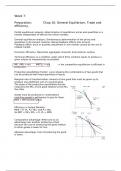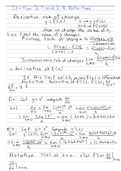Week 7:
Preparation: Chap 16: General Equilibrium, Trade and
efficiency.
Partial equilibrium analysis: determination of equilibrium prices and quantities in a
market independent of effects from other markets.
General equilibrium analysis: Simultaneous determination of the prices and
quantities in all relevant markets, taking feedback effects into account.
Feedback effect: price or quantity adjustment in one market caused by the one in
related market.
Economic efficiency: Maximizes aggregate consumer and producer surplus.
Technical efficiency is a condition under which firms combine inputs to produce a
given output as inexpensively as possible.
MPL / MPK = w/r MRTSLK = w/r -> the competitive equilibrium is efficient in
production
Production possibilities frontier: curve showing the combinations of two goods that
can be produced with fixed quantities of inputs.
Marginal rate of transformation: Amount of one good that must be given up to
produce one additional unit of a second good.
The slope of the production possibilities frontier
measures the MCP of one good relative to the MCP of
the other.
Goods must be produced in combinations
matching people’s willingness to pay for them.
MRS = MRTransformation
Efficiency in Output Markets:
MRS = PF /PC PF= MCF and PC= MCC
So MRT = MCF/ MCC = PF /PC = MRS
Comparative advantage: When one as an
advantage over another producing a food
because the cost of producing the good relative
to other goods is lower for him.
Absolute advantage: Cost of producing the good
is lower.
, Efficiency in exchange: all allocations must lie on the exchange contract curve MRS JFC
= MRSKFC = PF /PC
Efficiency in the use of inputs in production: MRTSFLK = MRTSCLK = w/ r
Efficiency in the output market: MRTFC = MRSFC = MCF/ MCC = PF /PC
Competitive markets fail because of:
- Market power
- Incomplete information
- Externalities
- Public goods: nonexclusive, nonrival good that can be made available cheaply
but which, once available, is difficult to prevent others from consuming.
Chap 17: Asymmetric
information
Asymmetric information:
Situation in which a buyer
and a seller possess
different information about
a transaction.
The lemons problem: with
asymmetric information,
low-quality goods can drive
high-quality goods out of
the market.
Adverse selection: Form of market failure resulting when products of different
qualities are sold at a single price because of asymmetric information, so that too
much of the low-quality product and too little of the high-quality product are sold.
Moral hazard: When a party whose actions are unobserved can affect the probability
or magnitude of a payment associated with an event.
Chap 18: Externalities, Public
goods
Externality: Action by either a producer
or a consumer affecting other
producers or consumers, but not
accounted for in the market price.
Marginal external cost: increase in cost
imposed eternally as one or more firms
increase output by one unit.
Marginal Social Cost: Sum of the
marginal cost of production and the
marginal external cost.
Preparation: Chap 16: General Equilibrium, Trade and
efficiency.
Partial equilibrium analysis: determination of equilibrium prices and quantities in a
market independent of effects from other markets.
General equilibrium analysis: Simultaneous determination of the prices and
quantities in all relevant markets, taking feedback effects into account.
Feedback effect: price or quantity adjustment in one market caused by the one in
related market.
Economic efficiency: Maximizes aggregate consumer and producer surplus.
Technical efficiency is a condition under which firms combine inputs to produce a
given output as inexpensively as possible.
MPL / MPK = w/r MRTSLK = w/r -> the competitive equilibrium is efficient in
production
Production possibilities frontier: curve showing the combinations of two goods that
can be produced with fixed quantities of inputs.
Marginal rate of transformation: Amount of one good that must be given up to
produce one additional unit of a second good.
The slope of the production possibilities frontier
measures the MCP of one good relative to the MCP of
the other.
Goods must be produced in combinations
matching people’s willingness to pay for them.
MRS = MRTransformation
Efficiency in Output Markets:
MRS = PF /PC PF= MCF and PC= MCC
So MRT = MCF/ MCC = PF /PC = MRS
Comparative advantage: When one as an
advantage over another producing a food
because the cost of producing the good relative
to other goods is lower for him.
Absolute advantage: Cost of producing the good
is lower.
, Efficiency in exchange: all allocations must lie on the exchange contract curve MRS JFC
= MRSKFC = PF /PC
Efficiency in the use of inputs in production: MRTSFLK = MRTSCLK = w/ r
Efficiency in the output market: MRTFC = MRSFC = MCF/ MCC = PF /PC
Competitive markets fail because of:
- Market power
- Incomplete information
- Externalities
- Public goods: nonexclusive, nonrival good that can be made available cheaply
but which, once available, is difficult to prevent others from consuming.
Chap 17: Asymmetric
information
Asymmetric information:
Situation in which a buyer
and a seller possess
different information about
a transaction.
The lemons problem: with
asymmetric information,
low-quality goods can drive
high-quality goods out of
the market.
Adverse selection: Form of market failure resulting when products of different
qualities are sold at a single price because of asymmetric information, so that too
much of the low-quality product and too little of the high-quality product are sold.
Moral hazard: When a party whose actions are unobserved can affect the probability
or magnitude of a payment associated with an event.
Chap 18: Externalities, Public
goods
Externality: Action by either a producer
or a consumer affecting other
producers or consumers, but not
accounted for in the market price.
Marginal external cost: increase in cost
imposed eternally as one or more firms
increase output by one unit.
Marginal Social Cost: Sum of the
marginal cost of production and the
marginal external cost.











